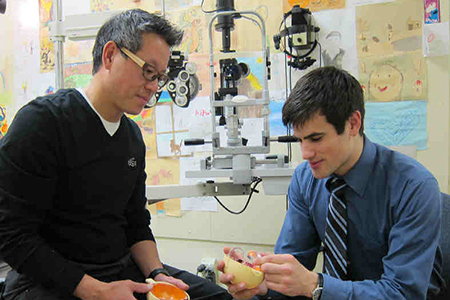If you love health, fitness and physiology, you may want to consider a degree in exercise science.
What Will You Learn?
In the most general sense, exercise science majors learn how to create and safely implement exercise programs for a wide range of body types, abilities and conditions—from asthma and pregnancy to obesity and arthritis. Courses cover a variety of topics, including nutrition, kinesiology (the study of body movement), sports ethics, injury prevention and rehabilitation, anatomy and physiology, and fitness and wellness concepts, among others.
Some colleges offer formal emphasis areas to allow you to further narrow your expertise within the exercise science program. For example, the University of North Carolina at Charlotte offers three concentrations within the exercise science major: aquatic leadership, strength and conditioning, and outdoor adventure leadership. Truman State University’s concentrations are broader. They include:
- Applied and clinical, which covers biomechanics, exercise physiology, strength and conditioning, personal training, sport and recreation management, cardiac and pulmonary rehabilitation, and related fields;
- Physical education and health, which is designed for students interested in teaching PE.and health in a K-12 public school;
- Pre-medical sciences, which covers pre-chiropractic studies, pre-physical therapy, pre-medicine, pre-physician assistant and related fields.
What Can You Do With A Bachelor’s Degree In Exercise Science?
Once you receive your bachelor’s degree, which is typically a bachelor of science, though some schools offer a bachelor of arts in exercise science, you have several options. You could:
- Get a job in your field as a cardiac rehab specialist, clinical exercise specialist, athletic trainer or recreational therapist;
- Go into research or teaching;
- Continue to graduate school to study in another health-related field, such as physical therapy, exercise physiology, public health or chiropractic medicine;
- Take an exam to become a certified fitness instructor through the American College of Sports Medicine; or
- Become licensed as a physical education teacher.
As for where you’ll work, the options are limitless. A hospital, research lab, private corporation, government facility, school system, nonprofit organization, rehabilitation facility or fitness center are most likely.
If the course work, careers and salaries associated with exercise science sound good, go ahead and start your search for colleges and universities that offer the major. It’s never too early to do research, and you may even stumble upon a pre-college program or scholarship for students interested in pursuing the degree.
How Money Much Can I Make With A Degree In Exercise Science?
Although some health- and fitness-related jobs (e.g., a personal trainer or nutrition educator) may not require you to have a bachelor’s degree, your education may help you acquire a higher salary.
Here are some of the 2015 median pay salaries for graduates with a bachelor’s degree, as well as the job outlook (i.e., projected percent change in employment) for 2014–24, according to the U.S. Bureau of Labor Statistics:
- Athletic trainer $44,670 Job outlook: 21 percent
- Exercise physiologist $47,010 Job outlook: 11 percent
- Recreational therapist $45,890 Job outlook: 12 percent
- Health educator $43,840 Job outlook: 13 percent
Note: The average growth rate for all occupations is 7 percent.



